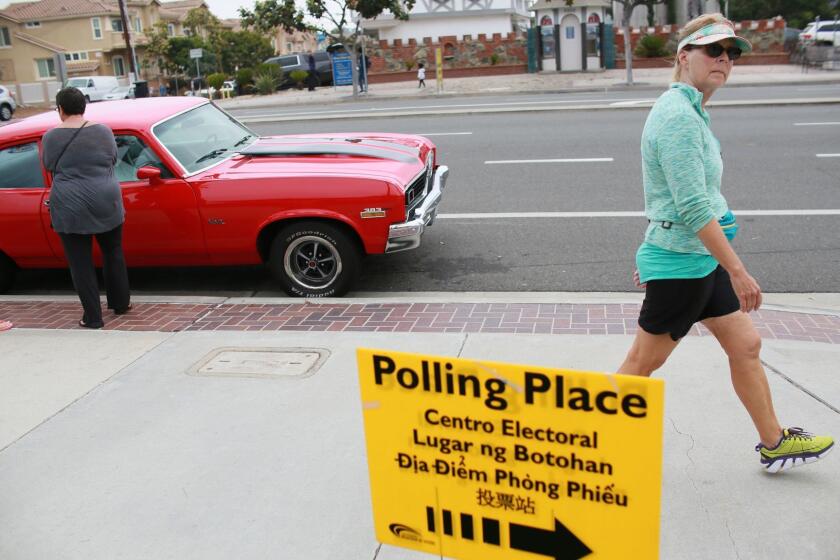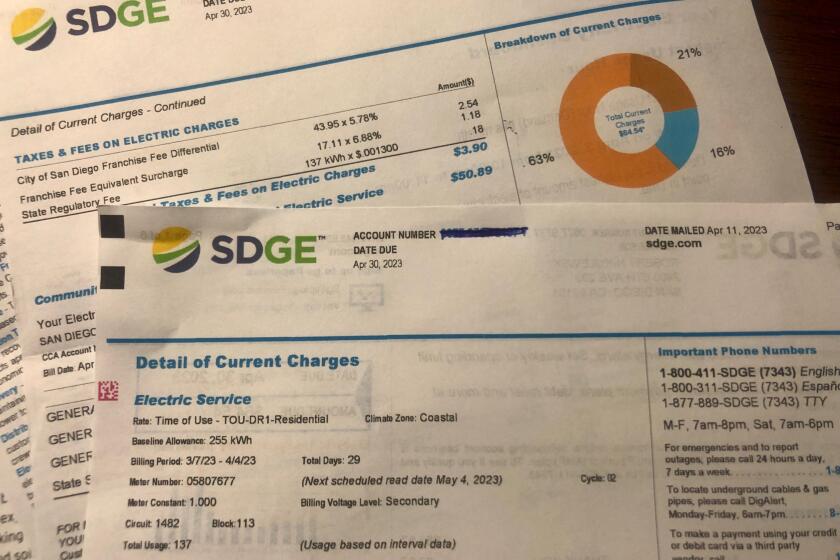Rep. Darrell Issa sues Doug Applegate for libel
The race may be over between Rep. Darrell Issa and challenger Doug Applegate, but one piece of business from the campaign may linger a long time.
The day before the Nov. 8 election, Issa sued Applegate for libel, claiming that two political ads have damaged his reputation.
Issa also named Applegate’s campaign manager Robert Dempsey and the campaign itself in the suit filed in San Diego County Superior Court. The incumbent, one of the wealthiest members in Congress, is seeking $10 million in damages and said he’ll donate any money awarded by the court to charity.
Issa had a 1,982-vote lead as of Wednesday afternoon — with 50.3 percent of the vote — and was declared the victor by news organizations Monday, with a small number of ballots remaining to be counted. Applegate subsequently admitted defeat but also announced he would run again in 2018.
Last week, Issa’s attorney said that they don’t comment about matters that are in litigation. Applegate’s campaign also declined to comment.
Issa wins ninth term in Congress »
It’s unusual, but not unheard of, for candidates to sue for defamation over statements made during an election, said Rick Hasen, a law professor at University of California, Irvine and the publisher of Election Law Blog.
In libel lawsuits involving public officials, the plaintiff has a higher burden of proof than in cases where the plaintiff is a private individual. In such cases, the plaintiff must prove that the defendant knew the defamatory statement in question was false, or acted with reckless disregard for the truth.
Issa sent Applegate’s campaign a letter and a draft complaint shortly after the first attack ad aired and threatened to sue.
Issa’s lawsuit takes issue with two commercials that Applegate’s campaign aired on broadcast and cable television this fall in Orange and San Diego counties. One of the advertisements cited an August 2011 article from The New York Times headlined “A Businessman in Congress Helps his District and Himself” that Issa has long contested. The other Applegate commercial was about statements Issa made about a bill that would benefit victims of the 9/11 terrorists attacks.
The lawsuit says the first ad uses a “fake, doctored headline” that says “Rep. Issa gamed the system to line his own pockets” that does not appear in the real New York Times article. The lawsuit says that the words, combined with a similar narration, give the false impression that the material appeared in the newspaper.
The 2011 article said the incumbent “has secured millions of dollars in Congressional earmarks for road work and public works projects that promise improved traffic and other benefits to the many commercial properties he owns here north of San Diego.”
Issa sold one of the properties on West Vista Way near the planned road improvements in January 2012 at a $1.6 million loss. The earmarked funds, which were sought both before and after Issa purchased the building, ultimately were not spent on the road project.
In October, Issa’s lawyers demanded that Applegate pull this advertisement from the airwaves and publicly apologize. In response, Applegate’s campaign said they would do no such thing, and that Issa was trying to stifle criticism of his record in Congress.
Issa challenges Applegate’s attack ads »
Issa has contested the accuracy of the Times article for more than five years, and when it was first published he issued a news release identifying what he saw as 13 errors in the report. Three were corrected — one was caused by inaccurate information in Issa’s family’s foundation’s IRS reports, and another came from bad information from the San Diego County assessor.
The tension between the newspaper and Issa was widely covered inside the Beltway at the time, and included publicly published letters between Issa and Dean Baquet, then assistant managing editor at the Times. Baquet is now the paper’s executive editor.
In the words of Washington Post media columnist Erik Wemple, it was “A spat to remember.”
Issa’s lawsuit says a second Applegate ad used “misleading statements about Congressman Issa’s voting record, and a doctored quote to wage the dishonest charge that Congressman Issa has opposed supporting the victims, first responders, and heroes of September 11th.”
In particular, it took issue with a line from the narrator that said “tea party Republicans actually voted to deny healthcare to 9/11 first responders.”
Issa voted against the legislation referenced by the narrator, but it was voted down by a bipartisan group of lawmakers including Issa, not just tea party Republicans, the lawsuit said.
It also says that Applegate’s ad used a doctored quote that said Issa dismissed the attack as “simply a plane crash.”
The ad attributed the line to the New York Daily News, but the quote in question appeared differently in the newspaper. It reads “The California congressman who called the Sept. 11 attacks ‘simply’ a plane crash ran for cover Wednesday under a barrage of ridicule from fellow Republicans, first responders and victims’ families.”
Congressional transcripts show that Issa said the attack was “simply” a crash in the sense that it did not include a dirty bomb or an aircraft packed with explosive ammunition.
Applegate’s ad also failed to mention the times that Issa has championed issues related to victims of the 9/11 terrorist attacks, the lawsuit said.
The commercials, according to the suit, exposed Issa to “hatred, contempt, ridicule and obloquy because they inaccurately portray the Congressman as deceitful, uncaring person and corrupt in his role as a member of the U.S. House of Representatives.”
The lawsuit did not say if any of Issa’s business dealings, political assignments, or other potential benefits were harmed by the commercials. It also did not explain how it determined that Issa suffered $10 million worth of damages.
Courts have been divided on whether or not laws about false political speech violate the First Amendment. But a 2012 Supreme Court decision that found a law that prohibited lying about military honors was unconstitutional suggests that courts might also decide that prohibitions against untrue political statements are also unconstitutional, UC Irvine’s Hasen wrote in a 2013 article in the Montana Law Review.
The result of the stolen valor ruling “is that laws regulating false campaign speech are in even more constitutional trouble than they were before, and any attempts to regulate such speech will have to be narrow, targeted, and careful in their choice of remedies,” Hasen wrote.
The Supreme Court has not ruled directly on the constitutionality of laws against false campaign statements, Hasan wrote.
Twitter: @jptstewart
joshua.stewart@sduniontribune.com
(619) 293-1841
Get Essential San Diego, weekday mornings
Get top headlines from the Union-Tribune in your inbox weekday mornings, including top news, local, sports, business, entertainment and opinion.
You may occasionally receive promotional content from the San Diego Union-Tribune.








